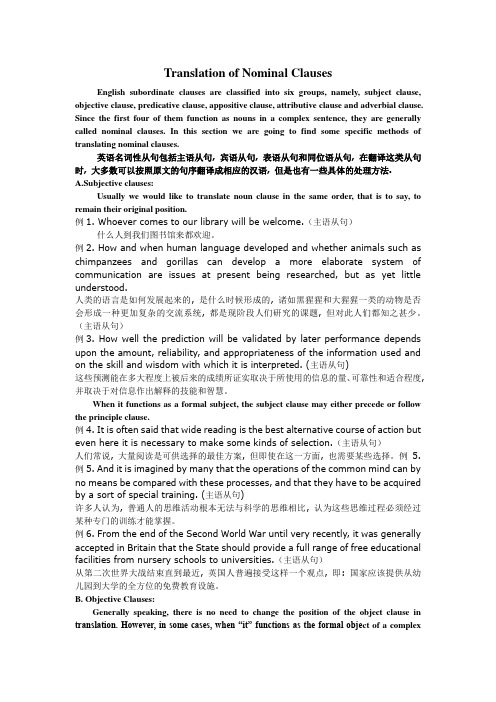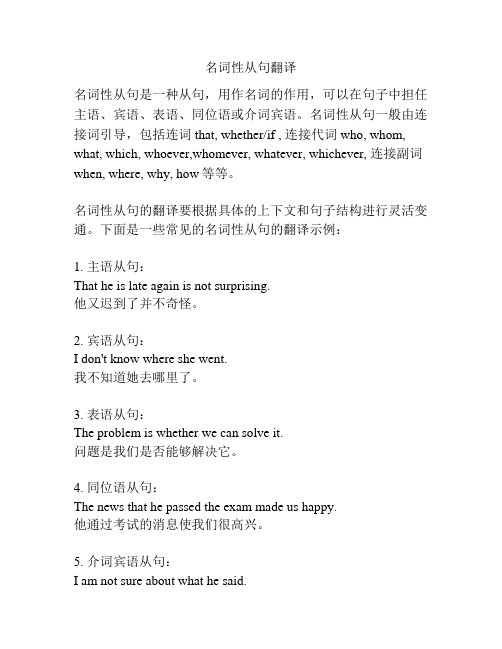第二十一讲 名词性从句的翻译1
- 格式:ppt
- 大小:545.00 KB
- 文档页数:39



Translation of Nominal ClausesEnglish subordinate clauses are classified into six groups, namely, subject clause, objective clause, predicative clause, appositive clause, attributive clause and adverbial clause. Since the first four of them function as nouns in a complex sentence, they are generally called nominal clauses. In this section we are going to find some specific methods of translating nominal clauses.英语名词性从句包括主语从句, 宾语从句, 表语从句和同位语从句, 在翻译这类从句时, 大多数可以按照原文的句序翻译成相应的汉语, 但是也有一些具体的处理方法.A.Subjective clauses:Usually we would like to translate noun clause in the same order, that is to say, to remain their original position.例1. Whoever comes to our library will be welcome.(主语从句)什么人到我们图书馆来都欢迎。
例2. How and when human language developed and whether animals such as chimpanzees and gorillas can develop a more elaborate system of communication are issues at present being researched, but as yet little understood.人类的语言是如何发展起来的, 是什么时候形成的, 诸如黑猩猩和大猩猩一类的动物是否会形成一种更加复杂的交流系统, 都是现阶段人们研究的课题, 但对此人们都知之甚少。

名词性从句翻译名词性从句是一种从句,用作名词的作用,可以在句子中担任主语、宾语、表语、同位语或介词宾语。
名词性从句一般由连接词引导,包括连词that, whether/if , 连接代词who, whom, what, which, whoever,whomever, whatever, whichever, 连接副词when, where, why, how等等。
名词性从句的翻译要根据具体的上下文和句子结构进行灵活变通。
下面是一些常见的名词性从句的翻译示例:1. 主语从句:That he is late again is not surprising.他又迟到了并不奇怪。
2. 宾语从句:I don't know where she went.我不知道她去哪里了。
3. 表语从句:The problem is whether we can solve it.问题是我们是否能够解决它。
4. 同位语从句:The news that he passed the exam made us happy.他通过考试的消息使我们很高兴。
5. 介词宾语从句:I am not sure about what he said.我不确定他说的是什么。
6. 间接引导名词性从句:He asked where I lived.他问我住在哪里。
7. 是否从句:I wonder whether/if she will come to the party.我想知道她是否会来参加派对。
8. 选择性从句:He asked me whether I preferred coffee or tea.他问我是喜欢咖啡还是茶。
9. 宾语从句(陈述句变为疑问句):Do you know what time it is?你知道现在几点钟吗?10. 宾语从句(连接代词):I wonder who is going to pick us up at the airport.我想知道谁会在机场接我们。

